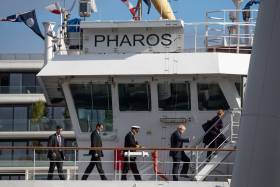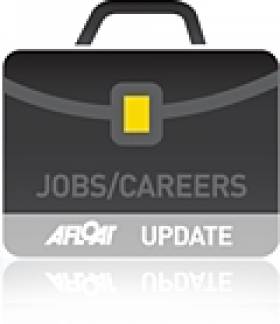Displaying items by tag: Maritime Careers
Trinity House to Bring Buoy Tender As Part of London International Shipping Week (LISW) in September
Trinity House, the General Lighthouse Authority (GLA) for England, Wales and Channel Islands, has signed up to join London International Shipping Week 2023 (11-15 September).
The GLA's multi-function buoy tender THV Galatea is to visit the Pool of London where it will be a host to showcase its people, skills and technology-driven practices on board.
LISW is an industry-facing calendar of over 200 events across the centre of London, making great use of the capital’s maritime connections and landmark venues, including Trinity House, the International Maritime Organization and the National Maritime Museum in Greenwich.
Maritime safety organisation Trinity House is taking this opportunity to engage with industry and government by bringing THV Galatea into the Pool of London to berth alongside HMS Belfast, the iconic floating visitor tourist attraction on the Thames.
While the custom-built buoy tender THV Galatea will serve as a platform to showcase Trinity House’s people and how it approaches its dual missions as an aid to navigation prover and maritime charity.
Trinity House will make the ship also available as a space for functions and meetings during the week, among them Afloat includes to highlight a Maritime UK Careers fair following the UKSST report launch which is to take place on Monday, 11 September. 1.00am - 16.00pm.
This invite-only event will welcome students from Further and Higher education establishments and introduce the wide-ranging maritime careers available for those considering opportunities after education.
Afloat also highlights the event of Maritime Careers and Opportunities on Wednesday 13 September (09:00 - 15:00) This high-level seminar will identify innovations in training and support for industry entrants throughout their careers, at sea and beyond. For more details including to reserve a free ticket click here.
As for the main showcase, this too is to take place onboard THV Galatea on Wednesday 13 September (1830-2130) when a private event is held for industry, the government and press/media.
Visitors to the event will meet a number of our multi-disciplinary shore and vessel teams, whose work and expertise will vary from cutting edge research and development, navigational requirements, multiple engineering disciplines, cadet training, maritime welfare and giving, marine operations and commercial services.
For a list of all events and details click here.
On the importance of sending THV Galatea to exhibit at LISW, Deputy Master Captain Ian McNaught said: “While we can only show our guests a small part of what we do, we hope that everyone will appreciate the critical work being done by our people to safeguard seafarers and ships and keeping our island nation open for business, but also to raise awareness of the importance of the Red Ensign and the UK’s vital maritime sector.”
National Maritime College of Ireland (NMCI) Open Day - “Let’s Sea What You’re Made of”
The National Maritime College of Ireland (NMCI) is to host their annual 'Open Day' next week at Ringaskiddy, Cork Harbour on Tuesday 8th of November between 10:00-15:00hrs.
The careers event will provide an opportunity to meet Shipping Companies and Organisations at the NMCI campus which is located beyond the ferryport in Ringaskiddy in the west of Cork Harbour. (For directions see further below).
Career Presentations
- Marine Electro-Technology
- Marine Engineering
- Marine Nautical Science
Presentations will be provided throughout the day on the theme of a maritime career held at the Main Lecture Theatre. These will start at 10:00 and will continue at regular intervals until 15:00.
- Meet the students and lecturers
- Ample parking and catering facilities
Tours of the College
During the Open Day, there will be group tours of the college that will be held at regular intervals. The tours will feature some of the college's specialist facilities among them:
- The high-tech ‘Bridge and Engine Room Simulator’
- The panoramic ‘Chartroom’
- Workshops
NMCI is an approved national centre for education in the maritime sector and is a constituent college of Munster Technological University (MTU). For further information, email: [email protected]
Directions to NMCI: follow the car ferry symbols on all road signs around Cork city. This will bring you to the village of Ringaskiddy, and then the college campus is situated on the left about 500m after the turn off for the ferry terminal.
Harland & Wolff Joins in Celebrating Maritime UK Week (10-16 October)
As Afloat reported today, Maritime UK Week (10-16 October) is underway with the Belfast shipyard of the Harland & Wolff Group also joining in celebrating the maritime sector campaign.
In addition Harland & Wolff will also highlight their sites, skills, and people as part of the Martime Week's campaign to focus on the latest developments in the maritime sector and engage people across the UK with the world of maritime.
The week long event is led by Maritime UK, the umbrella body for the maritime sector, bringing together the shipping, ports, services, engineering and leisure marine industries.
Throughout the week, people are invited to explore the world of maritime through a series of careers fairs and open days, among them an 'Open Day' to be held tomorrow on the Isles of Scilly ferry.
During the week, Harland & Wolff will be hosting a first on site roundtable at their Belfast yard which is Centred on Pride in Maritime.
This industry roundtable, is to be held on 13 October (10am – 11:30am) which is to bring together leaders and network members to discuss progress on ensuring maritime is welcoming for the LGBT+ community.
In addition for more information about Maritime UK's careers events page click here.
UK Prime Minister Promotes Maritime Careers at LISW Against Backdrop of Scottish Ruling on Parliament Suspension
UK prime minister Boris Johnson visited London International Shipping Week (LISW19) yesterday where he boarded NLV Pharos, a Scottish aids to navigation tender which moored alongside HMS Belfast, writes Jehan Ashmore.
In between promoting maritime careers to an audience of students, professionals and school leavers, the prime minister spoke to the media among them BBC which reported Boris Johnson had denied lying to Queen Elizabeth over the advice he gave her over the five-week suspension of the UK Parliament.
The prime minister was speaking after Scotland's highest civil court ruled on Wednesday the shutdown was unlawful.
Click here to watch an interview of Boris Johnston onboard NLV Pharos (heli-deck) in the Pool of London. Afloat adds the vessel as a venue was ironic given NLV Pharos operates for Northern Lighthouse Board, which is responsible for the waters off Scotland and the Isle of Man.
The NLB is the Scottish equivalent of Irish Lights and Trinity House as previously reported, is responsible for the waters of England, Wales, Channel Islands and Gibraltar. Together the trio form the General Lighthouse Authorities (GLA's) in the UK and Ireland.
As Afloat previously reported Princess Anne officially launched the opening of LISW19 on Monday. Earlier this year the Princess Royal, whose role is Master of Trinity House as part of the ongoing 150-year relationship between Irish Lights and the Lighthouse Authorities of the UK and Ireland, paid a visit to Irish Lights headquarters in Dun Laoghaire Harbour.
Princess Anne toured the Irish Lights ILV Granuaile (see related London reinactment sailing story) and visited the Baily, Rockabill and Kish Lighthouses. In addition the tour outlined Irish Lights’ work providing vital maritime safety services and modern navigation aids.
Opportunities in International Maritime Internships
A list of internships for the international maritime industry for 2011 has been announced and can be viewed on the Maritime Careers section posted on the Irish Maritime Development Office (IMDO).
The following companies: ABS, BP, Shell, Clarksons, Lloyds Register and the European Maritime Safety Association (EMSA) are offering a broad range of internship positions.
For further details on the internships and links to the companies, logon here































































